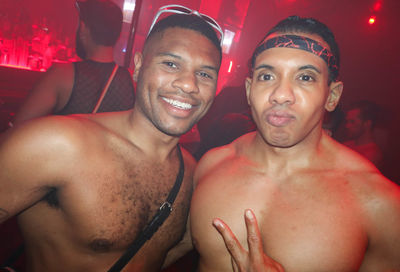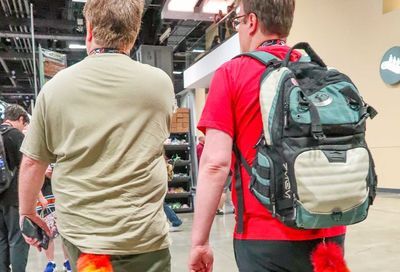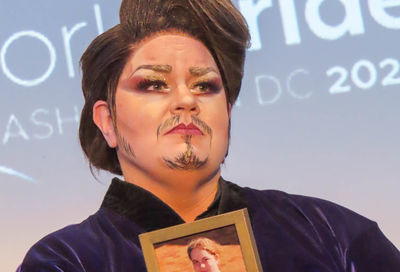Visible Moments
KhushDC honors five South Asian activists for their equal rights efforts
Sonali Gulati never had the chance to come out to her mother, who died several years ago. For the past two years, the South Asian lesbian filmmaker has been working on a 90-minute-documentary about the parents of other lesbians and gays in India, where homosexuality is punishable by law.
In Out & About, Gulati, a native of India who has lived in the United States for the past 14 years, interviews parents who share their children’s coming out stories and their feelings about having gay children.
”This is the hardest film I’ve ever made,” she says. ”Conversations with these parents have been hard for me, emotionally, because I never got to hear these words from my mother, and it’s been emotionally draining in many ways,” she says. ”I’ve had to pause and take a break and [say] I can’t continue this interview.”
Out and About, which is scheduled for release next summer, is not Gulati’s first film.
Gulati, 34, works in Richmond as an assistant professor at Virginia Commonwealth University’s department of photography and film. She has made several films, all of which explore themes about identity.
Her latest release, Nalini by Day, Nancy by Night, is about the outsourcing of American jobs in India. The 26-minute-film documents the lives of Indian telemarketers who use American accents and names in order to work for U.S.-based companies. The film earned Gulati first prize at the 24th International Cinematic Film Festival in Uruguay.
Now, Gulati is one of five women being honored in Washington by KhushDC for their efforts to advance the equal rights and visibility of South Asia’s GLBT community. The awards ceremony, part of the group’s Women’s History Month, will take place at 8 p.m. Saturday, March 3, at Cada Vez, 1438 U St. NW.
KhushDC is a social, support and political group for South Asian gays and lesbians in metropolitan Washington. The group’s president, Amrita Wassan, says this is the first time KhushDC is holding a ceremony to honor its women.
”A lot of us in the community have felt the need to connect with other communities, especially in terms of women,” she says. ”These five women have done a lot work in supporting LGBT queer women in coming out and creating spaces for them over the years.”
The ceremony, which includes a dinner and a Jalwa dance party featuring DJ Ashu Rai, kicks off with a panel discussion titled ”Creating Feminist Spaces: South Asian LGBTQ Organizing,” featuring the honorees.
Among them is Sivagami Shiva Subbaraman, associate director at the Office of LGBT Equity at the University of Maryland.
”Much of my contribution has been at the level of mentoring,” says Subbaraman, 51, a self-identified ”queer.” ”I’m not young and I came here 25 years ago, so for me being out has been really about helping people understand that people like me do exist, [even if we’re] from a different time and a different generation.”
In addition to KhushDC, Subbaraman has been involved with other local groups including Asian Pacific-Islander Queer Sisters (APIQS). She also served as the Asian representative for the D.C. Mayor’s Committee on LGBT Affairs from 1999 to 2002.
Also being honored are Trishala Deb, an activist in North Carolina, Georgia and New York City’s South Asian gay community who serves on the steering committee of South Asian Lesbian Gay Association; Deepali Gokhale, founder of Queer Progressive Agenda, who currently lives in Atlanta; and Suriya Jeyapalan, who has been active on the Massachusetts Area South Asian Lambda Association’s steering committee for nearly seven years.
Wassan says she hopes to bring together the South Asian community within D.C. and along the East Coast, in order to explore ways in which it can be supportive of women who are gay or in the coming-out process.
Subbaraman understands that mission.
”Particularly for South Asian women, there’s very little visibility. [We] are very marginalized and most of us have had to stay away. Especially if you’re an immigrant, it’s very hard to be out and to do anything.”
That has been one of the main inspirations for Gulati to make her latest film, Out & About.
”There’s power in representing one’s own self. The more people that do it, the more we’ll see ourselves in mass media.”
Tickets for KhushDC’s Women’s History Month celebration are $20-40, and available at www.khushdc.org.
Support Metro Weekly’s Journalism
These are challenging times for news organizations. And yet it’s crucial we stay active and provide vital resources and information to both our local readers and the world. So won’t you please take a moment and consider supporting Metro Weekly with a membership? For as little as $5 a month, you can help ensure Metro Weekly magazine and MetroWeekly.com remain free, viable resources as we provide the best, most diverse, culturally-resonant LGBTQ coverage in both the D.C. region and around the world. Memberships come with exclusive perks and discounts, your own personal digital delivery of each week’s magazine (and an archive), access to our Member's Lounge when it launches this fall, and exclusive members-only items like Metro Weekly Membership Mugs and Tote Bags! Check out all our membership levels here and please join us today!



















